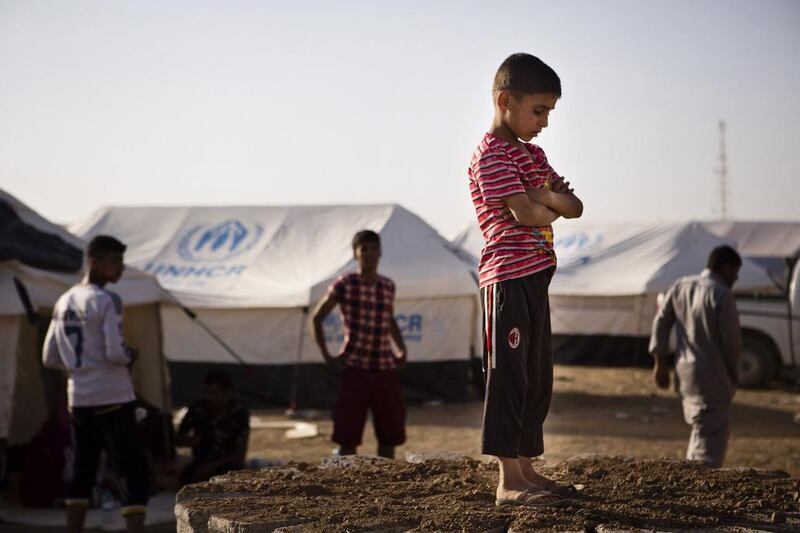Click to trace the militants' footsteps
KIRKUK // Air strikes drove a fresh wave of terrified Iraqis into Kurdish-held territory on Sunday after hundreds of thousands had already fled a vast area of Iraq captured by Islamist extremists.
Queues of vehicles escaping the fighting stretched for kilometres as they passed through a checkpoint on the southern edges of Kirkuk, a long-disputed city captured by Kurdish forces last week during the turmoil of an offensive led by the Islamic State in Iraq and the Levant (ISIL).
The group, an Al Qaeda offshoot that has imposed a harsh interpretation of Sharia on captured territory, capitalised on festering Sunni resentment against the government of Iraq's Shiite prime minister, Nouri Al Maliki.
As many as 2,000 people rushed into Kirkuk on Saturday night, which the Kurdish Peshmerga forces at the checkpoint described as a large surge since the ISIL campaign began on Tuesday.
Many if not most of those arriving on Sunday were Sunnis. While some said they fled fearing the group’s ruthlessness, others were driven from their homes as government jets and helicopters attempting to drive out the militant group.
“Maliki treated us badly, but ISIL is even worse,” said Kasra Hassan, 52, who left her hometown of Tikrit on Sunday for Kirkuk’s Tisaeen neighbourhood. Like others displaced by the fighting, she fled to the city to stay with relatives.
ISIL last week took control of Tikrit, about 150 kilometres north of Baghdad, and began imposing a strict regime on the city of more than 260,000 people, she and others said.
The militant group gave ultimatums saying that residents as well as soldiers and policemen had to repent for joining government forces or face execution.
“My brother and my son were in the military, and they were forced to do this,” she said.
She finally decided to flee when government air strikes began on Saturday and killed Mohammed, her 12-year-old son, she said. “They attacked us indiscriminately, bombing houses,” said Mrs Hassan, who has five other children, as she broke down in tears. She said her son was trying to help a friend take cover from an air raid when he was struck down by an exploding projectile.
As dozens of families crossed into Kirkuk on Sunday, ISIL posted images of its militants allegedly leading captured Iraqi soldiers to fields before executing them in Tikrit.
The graphic images, which have not been verified, will likely further stoke Iraq’s sectarianism. In response to the ISIL assault, Shiites have rallied to protect Baghdad and holy sites in cities to the north.
In the predominantly Sunni areas taken by ISIL, the Iraqi military carried out air strikes on Sunday, although there were few details released about what areas had been targeted.
An air strike on a convoy of Kurdish forces killed six near Khanaqin in what was likely an accidental attack.
Iraqi commanders said security forces had pushed the militants back from their advanced positions about 80 kilometres north of the capital’s city limits. For those fleeing the fighting on Sunday it was the government air strikes that had instilled the most fear.
Jabar Atallah said the Iraqi military had targeted his hometown of Owja, the birthplace and burial site of the former Iraqi dictator Saddam Hussein. Many in the area hold fierce loyalty to the deceased leader.
Mr Attallah, 27, and 70 other members of his family all left on Sunday in a convoy of rickety pickup trucks piled high with everything from mattresses to children’s toys.
“In the village the helicopters and planes hit us hard,” he said as they crossed into Kirkuk. “There were many casualties — many.”
He also expressed support for the ISIL offensive, referring to the militants as "revolutionaries".
Asso Kamil, 38, a staff sergeant in the Kurdish Peshmerga, estimated that some 2,000 people had fled from areas near Tikrit, about 100 kilometres to the south, between Saturday evening and early Sunday morning. Some were Iraqi soldiers who, having deserted en masse during the initial phase of the uprising, continued to seek refuge, he said.
“I saw soldiers who came barefoot,” he said. “Yesterday, another soldier came with both arms broken. He said [ISIL] did it to him.”
Fleeing chaos was why Jabar Ashour, 50, a resident of Tikrit, decided to come to the relative safety of Kurdish-held areas with his extended family.
“The planes are attacking and we left. We left everything; our homes, our belongings,” he said as he headed north with his family to an uncertain future.
foreign.desk@thenational.ae





